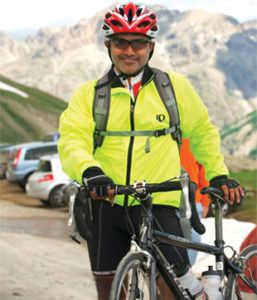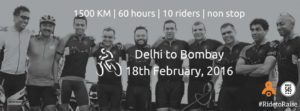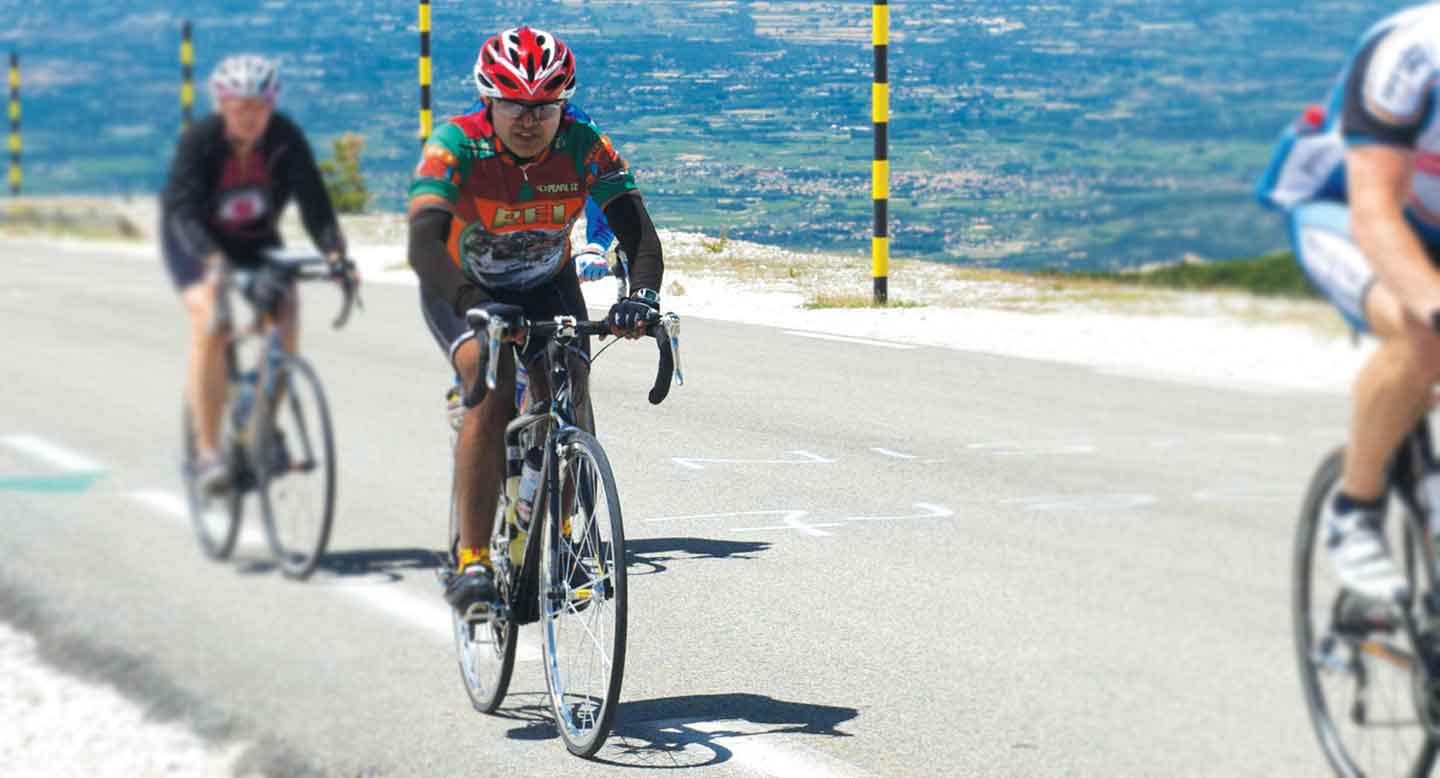A tete-e-tete with Prashant Mehta, a passionate cyclist and a half iron man, and partner with Lightbox Venture Capital on his personal and professional journey and how the two complement each other, making him more efficient, energetic and a positive person overall.

The ‘Live Your Passion’ Series
Over the last five years, at The Smart CEO, we’ve interviewed over 3500 entrepreneurs, CXOs and investors from many different sectors, across India. We’ve always maintained our positioning as a platform for knowledge sharing by leaders and most of our stories have revolved around ‘why, how and in what context’ leaders make key decisions in the professional lives. While chit-chatting with several of our interviewees, we got to know about what some of these leaders did outside of work. We’ve met a promoter of a family business who was a remarkably talented chess player, an entrepreneur who lead a rock band as a lead guitarist, an advertising industry leader who was a scuba diving coach, and so on.
The Live Your Passion series was born out of a conversation with one such multi-talented business leader. We realized that people who excel at the workplace often bring the same passion, energy and hard work to whatever they do. In this series of articles, presented to you by Swiss luxury watch maker, Frederique Constant, we bring to the fore how these high-achievers pursue their hobbies with the same sort of commitment.
In our first edition of the Live your Passion series, we feature the story of Prashant Mehta, a startup CEO-turned-venture capital investor.
An endurance cyclist, who has done numerous rides across the world, he once rode from Mumbai to Pune and back for over 13 hours and then trekked to the Everest Basecamp the same week. He first completed a half iron man (1.9 km of swimming, 90 km bike ride and 21.1 km running) in 2014, and since then has pursued the sport of triathlon with all his passion. What drives him to this, especially after completing 14-hour days during a work week, and he simply says: “It is the adrenalin rush of completing a race. It just keeps me going. What’s more fun is also the fact that I am constantly picking up ideas from a new set of people.”
However, to introduce him as an ‘endurance man’ alone will be completely unfair to his professional journey.
After completing his MBA at the Wharton School, in University of Pennsylvania, Mehta spent a few years in what he calls ‘the dog eat dog world of finance’ at Lehman Brothers and subsequently joined Yahoo (when it was still a force to reckon with), where he led commercial operations for the Emerging Markets Group, generating over US $150 million in annual revenues.
It took me 7 hours to complete my first iron man and that gave me a lot of confidence. Four years ago, I would have laughed about this as I didn’t know how to swim then. The big lesson for me is that if you put your mind to it, anything is possible
![]()
Having understood the opportunities in the Internet landscape in emerging markets, he moved his base to Mumbai to lead Komli Media, a leading ad-tech firm. After a five year stint with the startup, which ended with him becoming its CEO, he became a partner of Lightbox Venture Capital in 2014.
In this interview, Mehta talks to us about his personal and professional journey and how the two complement each other and make him more efficient, energetic and a positive person
Excerpts from the interview:
Entrepreneurship and endurance sports have a lot in common. Please draw a parallel between the two from your experience.
You definitely need to be extremely passionate about what you do to become an endurance cyclist or half ironman, where you spend anywhere between 5 to 14 hours at a stretch. Utmost determination is crucial to succeed. By succeed, I don’t mean to win all the time but to not to let anything stop you. There will be days when you get up at 4 am in the morning and are out on the roads, and you may be asking yourself “why am I doing this, while the rest of the world is fast asleep.” For me, success is completing the race and it the adrenalin rush that keeps me going. Similarly, an entrepreneur has to find his or her passion that gives that extra energy and motivation – whether it is building a great product, meeting customers and so on. Without that extra boost, being an entrepreneur can be very lonely, as there are very few people one can talk to about the real issues in a business.
It is not just why you are doing this, but what you are giving up – like time out with your friends and family. In many ways, this is a part of what entrepreneurship is all about. When you are an entrepreneur, you have to give up your personal life as it is all about the company and the people you take on board. There are many things including hiring, launching a new product or meeting new people that is always on your mind.
Another very important similarity is that it is a long journey. Entrepreneurship is not a sprint and an endurance person is not sprinting either. You have to find a way to pace yourself. You need to find that rhythm but that doesn’t mean you are going easy either – you push yourself at a pace that is sustainable. I learnt to pace myself better in my professional life and that gave me more time to pursue my outdoor activities.
What is amazing is that the more I pursued my passion, the more energy I got to focus on work. And that reiteration was incredible. I could go longer in the day and it kept my mind more active. If there is day that I don’t work out, people can tell from my demeanour.

Today, we see more people taking work-life balance very seriously. According to you, what led to this?
The factors that help in achieving this balance differ from one to another. Sometimes, it is not a positive one. There could have been an illness or death of close ones to make you realise that we have one life only and we have to live that to the fullest.
For me, while I was in California, I was doing a lot of long distance cycling. But when I moved to India, 9 years ago, there were not that many cyclists and I wasn’t sure where to start. The traffic also made me very nervous and the pollution bothered me. Subsequently, I ran into a few people and that’s when we started building a group and that group has flourished and people with a similar mind set are a part of it.
Typically, how much time do you dedicate to cycling and how do you manage to balance both cycling and work? How do you prepare for big rides?
There is always a conflict – work needs you longer and my body and mind wants more time for cycling and other activities like iron man.
When we have an event coming up, I ramp up my workout routine – averaging an hour for 3 or 4 days a week, and then 2 to 4 hours over the weekend.
The kind of training also depends on the ride. For example, in February last year, we did a ride for charity (to raise funds for a hospital) from Delhi to Mumbai, a 1500 km ride, which involved night rides too. Our goal was to finish it in 60 hours. To achieve this, a lot of the practice was at night which would go on till 4 am. We had to get used to riding at night and with very little sleep. There were some weekends where we would ride from 11 pm to 2 am and have an hour or two of sleep and get back around 4.30 am for another training session. This ride took a lot of coordination as we had to ride non-stop and everyone had to perform. This definitely was also a personal benchmark ride for me.
What is your take away from your cycling journey – both at personal and professional level?
There are lots of lessons. First, cycling, in particular, is a team sport, of course there are individual winners, but a lot has to do with the team and the individuals that you are riding with. One of the key lessons is that not only do you have to take care of your team but also if you find that a member of the team is not doing well, you have help them catch up.
You cannot say that the person is weak and lose him or her. In cycling, when the entire team works together is when your group moves forward. It is like a Peloton: when you ride together, there is lot more efficiency in making progress. So, it is all about the people around you and you have to find a way to take care of them. They will have your back, when needed. Be there for your team, your work, or your friends.
Second, typically, not everyone is good at everything. So, if you have four people riding together, you will have someone good at riding on flat roads – sprinting or pedalling, climbing or downhill. What we do is when it is time for a flat road ride those who are better at it will be ahead and pushing themselves, similarly, for a climb uphill and downhill. Incidentally, I am good at downhill and I get ahead when it comes to downhill. This is no different from work. Even if you are the founder, you are not good at everything. You need to find the best person who has talent for marketing and sales and let them take the lead when its time.
Wheels of Fortune Prashant Mehta
Owns : 6 bicycles
Group size : 14 to 15
New bike on the block : A carbon racing bike called Canyon (a German bike)
Maximum distance biked : 1500 kms
Favourite ride : Ride done two years ago from Manali to Leh, distance 700 to 800 kms
Fun ride : Last December, a ride from Bangkok to Phuket – 800 kms
Group name : Wurlee 545 (they used to meet at Wurlee at 5.45 AM and hence the name)
“The single most important thing that we invest in is the entrepreneur”
In addition to the usual suspects of a great team/big problem/large market – what makes you say yes to a deal? What makes you say no?
It is important to understand how we invest in Lightbox. Unlike most venture funds, we are making limited investments in this fund. We are not betting on companies but looking at building great companies. When you are betting on companies, even if one doesn’t work, there are a few more that will. But, in our case, we need to make all our eight investments work. When you build eight companies and invest in them for 7 to 10 years, it is a long term commitment. So, in a marriage, just like how you spend time in getting to know all the aspects of a person before you get married to him or her, we spend a lot of time getting to know the entrepreneur – both at the professional and personal level – as the single most important thing that we invest in is the entrepreneur.
Having said that, we like to see a big enough market opportunity, interesting dynamics within a market. For example, we prefer a fragmented market and like the fact that there could be multiple winners.
We do look at the business model as well, but the reality is what someone starts with is not what they end up with. Only thing that is constant is the entrepreneur. So for us, we want to know if we can trust the entrepreneur. Can we have an open conversation with the person, debate different ideas?
We have made 5 investments so far and are actively looking at whole bunch of ideas as we speak.
Tell me about a time you got lucky as an investor and a time you got unlucky? Maybe, a deal you missed out on
We will miss out on a lot of companies as we only have the ability to make eight investments. There will be great companies that we won’t get a chance to invest in and we are okay with that. Our goal is to find eight companies that we like and make sure they become great investments and great businesses.
Earlier people would come with an idea and expect an investment in their company. Today, we have entrepreneurs who have bootstrapped their business, have a working model, a working product and customers who have tested it, who are seeking funds
![]()
What is it about your role that excites you?
I get to feel younger daily. We are meeting such amazing entrepreneurs and their ideas are something I would never have thought about. Lightbox is a 3.5 year old fund and we are kind of a start-up ourselves in many ways. I have this privilege to be in a role where Iam in a start-up which is what I love and yet I am meeting phenomenal entrepreneurs daily.
Not only this. Each day is so different and unpredictable. I don’t know what’s going to happen when I meet this new company, whether we will be thrilled or disappointed or what is going to happen with our portfolio companies, like a new product launch.
A pitch from an entrepreneur you’ll remember forever. Please narrate it for me.
Our meeting with Jaydeep Barman who runs Faasos was interesting. When I first met him there was something about him that I liked. It was his approach, which was non-sales, humble and straightforward and with a grand vision. But he also told us that, “today, I don’t know what path to take to get there.” What I liked was that he was being real. We like when people don’t come in with their fancy presentation and just try to sell us something. We would like to see if the person is open for debate and critique and he was. We have learnt so much from him.
Had he sent us his presentation alone, we would not have met him; but when we met him, it didn’t matter how his presentation was, it was the person. He made us so comfortable and hence, we invested in the company.
Where do you see the PE/VC ecosystem in India 10 years from now?
I think that VC world has a lot of lessons to learn. Like entrepreneurs, VCs have made many mistakes in the past; one of the mistakes was to fund companies and then just tell them to grow at any cost. The VCs have certainly started to learn that they need to focus on things that matter like retention, unit economics and so on. And that is will make an entrepreneur to be more rational and force valuations to be reasonable.
Everyone needs to recognise that as a VC, our key goal is to return capital and the only way to return capital is to exit companies. And sometimes you may have to exit companies sooner than what you might have expected to do. That is part of the nature of portfolio that you manage. Most of us, if given a choice, want to maximise every investment. But the reality is until the VC industry really proves itself, we will have to make certain compromises, not in the kind of investment made but in the returns we want to get from an investment and may have to sell an investment sooner. This is already happening.
VCs in India are going to have a much better path over the next few years than the last few years. We have got a more vibrant consumer ecosystem of adopters and that is going to help improve the returns in the kind of investment that we make. Hopefully, the government continues to make improvements in certain areas that help propel more consumers to come online.

According to you, what are the “yet-to-be-hot” sectors?
Healthcare and education. There have been some investments already, but more is needed. We feel that there has been a lot of talk about financial services, but it is still early days and we believe that in the next few years we should see some interesting companies come out of fintech and get more adoption in certain core areas. This apart, we are watching cryptocurrency adoption in India very closely.
Highlight one or two key entrepreneurship trends that you are witnessing today?
In the last few years, people would come with an idea to the investors and expect them to invest in their company. But what we see now are entrepreneurs who have bootstrapped their business and have a working model, a working product and customers who have tested it, who are seeking funds. It tells us that someone is committed and not here for a fast buck.
We have also noticed that there are many entrepreneurs who come back with some real experience, worked in a specific area, seen the problem and have a solution
Quick facts
Fund Size : Second fund is about US $150 million
Investment made : 5
Total investments : 8
Key focus : Entrepreneur
Latest Investment : Melorra, a jewellery company
Sectors to watch out for : Healthcare, education, fintech and cryptocurrency
This is the first in the “Live your Passion” series presented by Frederique Constant. Through this, we aim to showcase how leaders in the corporate world are living their passion and at the same time leading and scaling up their organisation with much energy and gusto. Hope you enjoy reading this as much as we enjoyed putting this together.
